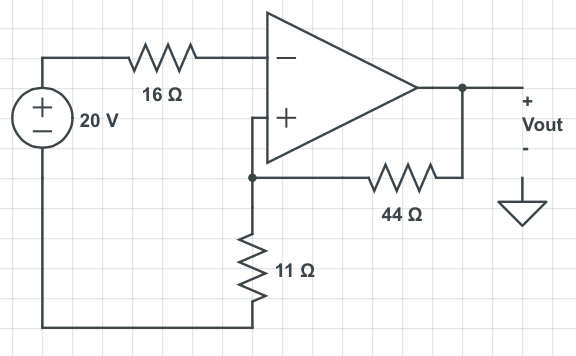| (2 intermediate revisions by the same user not shown) | |||
| Line 30: | Line 30: | ||
Let's call that node V+:<br /> | Let's call that node V+:<br /> | ||
<math>\begin{align} | <math>\begin{align} | ||
| − | \frac{V_+ - 0}{11} + \frac{V_+ - Vout}{44} = & 0\\ | + | \frac{V_+ - 0}{11} + \frac{V_+ - Vout}{44} = & 0\\ |
| − | \frac{20}{11} + \frac{20 - Vout}{44} = & 0\\ | + | \frac{20}{11} + \frac{20 - Vout}{44} = & 0\\ |
| − | 80 + 20 - Vout = 0 | + | 80 + 20 - Vout = &0\\ |
Vout = 100V | Vout = 100V | ||
\end{align} | \end{align} | ||
Latest revision as of 17:45, 26 April 2015
Op Amp Practice
Practice question for ECE201: "Linear circuit analysis I"
By: Chinar Dhamija
Topic: Op Amp
Question
Find the output voltage, Vout.
Answer
First we know that $ V_- $ = $ V_+ $
$ V_- $ = 20V = $ V_+ $
The next step would be to do nodal analysis at the node where the two resistor wires intersect.
Let's call that node V+:
$ \begin{align} \frac{V_+ - 0}{11} + \frac{V_+ - Vout}{44} = & 0\\ \frac{20}{11} + \frac{20 - Vout}{44} = & 0\\ 80 + 20 - Vout = &0\\ Vout = 100V \end{align} $
Questions and comments
If you have any questions, comments, etc. please post them below
- Comment 1
- Answer to Comment 1
- Comment 2
- Answer to Comment 2


